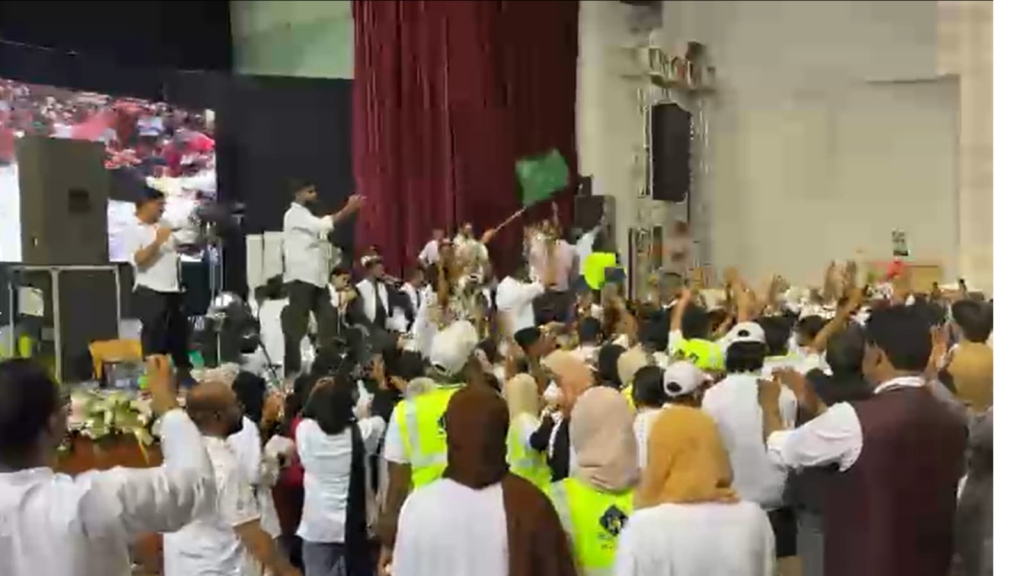New DelhiAugust 29, 2025 11:00 AM IST
First published on: Aug 29, 2025 at 11:00 AM IST
THERE was qawwali, a packed Jawaharlal Nehru Stadium, youngsters swaying to the music, and right there, in the front, dancing with the others, a group of women wearing the hijab.
The occasion was a celebration held by the Indian Union Muslim League (IUML) to mark the inauguration of its national headquarters, Quaide Millath Centre, in Delhi. And the women, a sign of how far the Kerala-based IUML, a Congress ally vilified by the BJP – and lately the Left – as “communal”, had come in creating space for them on its stage.
“The energy was unmissable. We felt we had really accomplished something,” says Shifana Naduthodi, a fourth-year student at Delhi University and one of the key volunteers at the function.
In Kerala, especially in its northern districts where Muslims have a strong presence and are a formidable vote bank, women from the community have been joining the ranks of college students in growing numbers. What the IUML has done is bring them into political, social, and economic spheres.
While the IUML has a separate women’s student wing called Haritha since 2012, women are also increasingly active in its larger Muslim Students’ Federation. Najma, a block panchayat member in Malappuram district and a member of Hartiha, says: “These outfits have helped us form strong friendships, and given us dignity, confidence, social consciousness and a sense of the political agenda.”
Najma names several campaigns organised by Haritha such as ‘All Spaces are Ours Too’, ‘Brave To Say No’, adding: “These have helped us stand, given us a space.”
Najma’s faith in the IUML remains intact despite her own experience when she along with two Haritha office-bearers, Fathima Thahliya and Mufeeda Thesni, faced disciplinary action over accusations of sexual harassment against the MSF leadership in 2021. They accused MSF leaders P K Navas and V Abdul Vahab of derogatory remarks.
The IUML leadership reinstated Najma and the others after three years, and brought them back into the state leadership of the Youth League. Najma sees it as proof of the party’s backing for their stand. “Now we are back in the thick of activities.”
Shifana, an office-bearer of the MSF’s Delhi unit, talks about the strength she drew from the IUML when she first arrived in the Capital for admission in Delhi colleges, and stood out due to her hijab. “I fought back, I normalised the purdah – it is entirely my choice – fought elections and challenged it whenever I felt my rights were denied. The support and help the party gave me and the other students has been amazing.”
Fatima Muzaffar, one of the first women in the IUML’s national leadership, says: “The most significant message the IUML has sent out is the role of education in empowering women… The leadership has also encouraged us to work autonomously.”
Muzaffar, along with Jayanthi Rajan, a Dalit woman leader from Kerala, were appointed to the IUML’s National Council in May.
Muzaffar, the daughter of former IUML MP Abdul Samad as well as member of a local body in Tamil Nadu, says: “Muslim women in states like Tamil Nadu and Kerala are privileged, and it is because of the IUML. For women in other parts of the country, the primary concern is roti, kapda, makaan (basic necessities). So where do they get time for political participation?”
Pointing out that the school dropout rate in Minority Concentrated Districts stands at 25%, Muzaffar adds: “Many Muslims do not have a roof over their heads, and now they fear they may have to prove their identity as Indians too.”
Najma says: “Ours is the politics of being a Muslim and being a woman. Each has its issues… Politics should be inclusive, so as to address religious, linguistic, ethnic and gender identities.”


